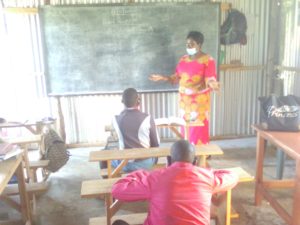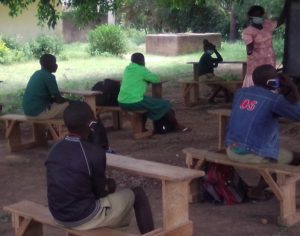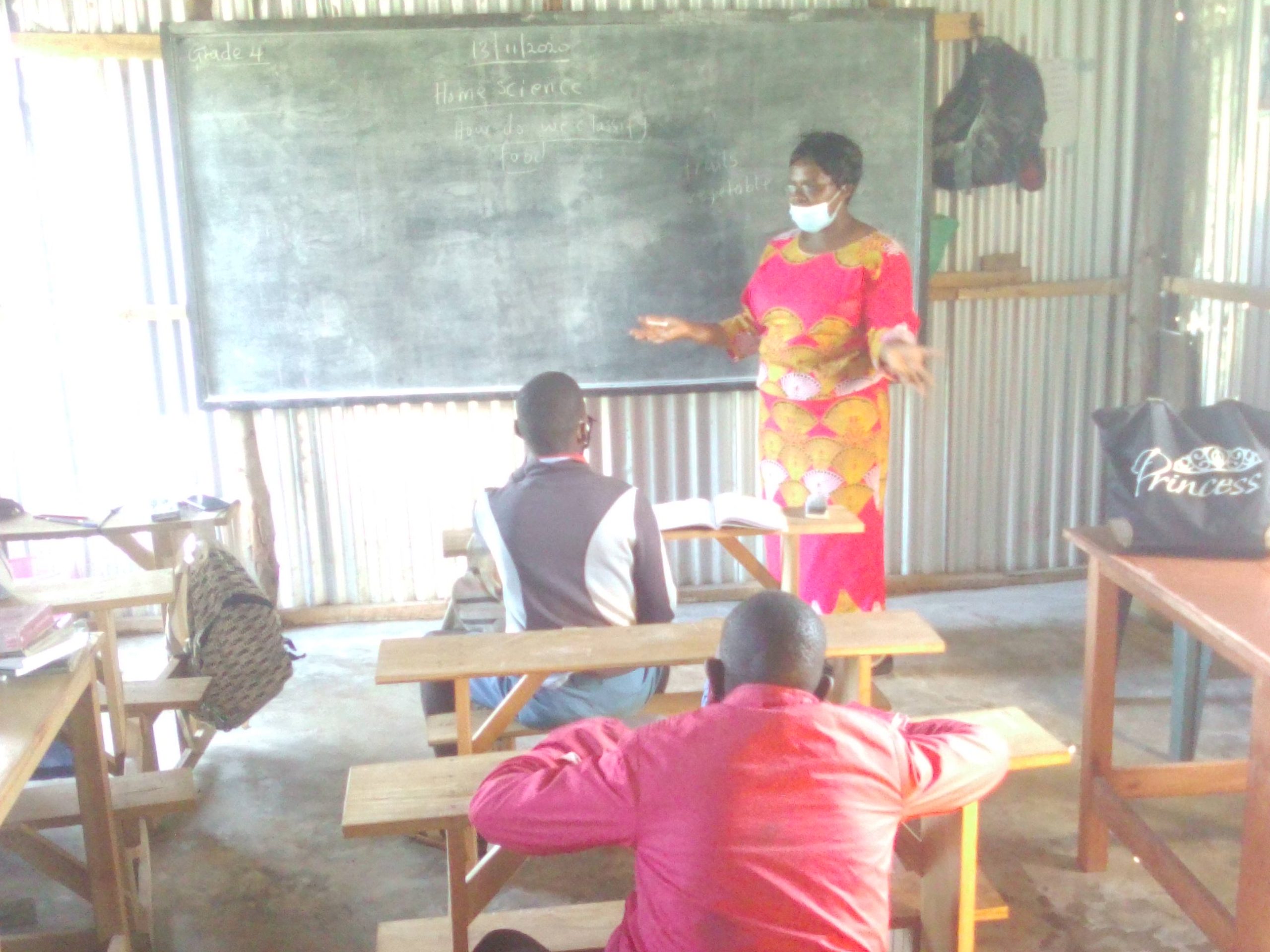By Gilbert Manyara
Busia County, Kenya: The outbreak of COVID -19 in March this year in Kenya forced the ministry of education to order the closure of all learning institutions across the country to curb the possible spread of the virus in schools.
The learning calendar was disrupted, forcing children to stay at home during the pandemic.
However, after staying at home for seven months, the ministry of education finally allowed Grade four pupils, class eight and form four candidates to go back to their respective schools and resume learning.

Picture by Gilbert Ochieng.
The Kenya National Examination Council (KNEC) in an effort to test the students’ knowledge instructed the school heads to administer assessment/ evaluation tests for grade four pupils under the new Competent Based Curriculum (CBC) program as well as the class eight candidates.
However, a spot check carried out by Talk Africa has established that the Intelligent Quotient (IQ) of a big number of students has dropped to an extent that they are unable to remember all that they had learned prior to the closure of schools due to COVID 19 pandemic.
Key factors contributing to low IQ
After the closure of all learning institutions, the national government in collaboration with the ministry of education came up with a program that would enable the students to access learning materials through the internet.
However, the majority of the parents especially those from Bunyala sub-county in Budalangi constituency, Busia county who had been displaced by floodwaters were forced to seek refuge in the internally displaced persons(IDP) camps.
Many of them could not afford to sponsor their children to study through the internet owing to the financial crisis as well as the stressful situation they had been facing while living at the camps.

Another notable factor that had greatly contributed to the students’ low IQ level was over congestion at the IDP camps, a situation that had made it extremely difficult for the students to have ample time to study.
A large number of the students living at the camps by then had been compelled to accompany their parents to work in rice fields with others engaging in sand harvesting and fishing along River Nzoia and beaches along with Lake Victoria such as Marenga, Mulukoba, and Omena –sardines among others to make ends meet.
All these engagements had discouraged them from studying hence lowering their thinking capacity or IQ for that matter.
In an exclusive interview with Talk Africa at Bunyala sub-county headquarters recently, Bunyala sub-county director of education George Owuoche said that the assessment was meant to assess and evaluate the Intelligent quotient (IQ) of the students.
After staying out of school for several months due to the outbreak of COVID – 19 in the month of March this year, the assessment was to enable the teachers to identify the weaknesses and strengths of their respective students so as to know where to start teaching them in order to improve on their academic performance.
The sub-county director of education concurred that most teachers in the sub-county had complained to the effect that the level of understanding of the majority of the students had drastically gone down due to the long stay at home, but he is quick to add that teachers have strived to do all their disposal to improve or bring the affected students back on track.
“It is true the Kenya National Examination Council (KNEC) assessment had established that the IQ of the majority of the students had drastically gone down due to the long stay at home for several months as a result of COVID- 19 pandemic.
” I want to applaud the teachers for doing everything at their disposal to bring the affected students back on track”, says Owuoche, adding that all class eight and form four candidates have resumed learning in readiness for their final exams scheduled for March this year.
He further concurred with the parents that the majority of them could not afford the high cost of online studies considering that downloading the learning materials required a lot of money.
“Majority of parents could not afford the high cost of online studies because downloading the bulky learning materials from online is quite expensive,” he said.
Scores of parents who spoke to Talk Africa said even though the national government and the ministry of education had initiated an online learning program, they could not afford to download the bulk of learning materials due to lack of funds.
“I was uprooted from my home in early May this year by floods and forced to seek refuge in the IDP camp with my five children.
That was after the outbreak of COVID 19 in the month of March, but due to the financial challenges, I could not afford to sponsor my two children in class eight and one in form four to study online”, said Everlyne Sakwa, adding that this has ended up lowering the thinking capacity (IQ) of the students.
She is of the opinion that the national government and the ministry of education should have allocated the funds that would have enabled all the students especially those from poor family backgrounds to the learning materials.
“The thinking capacity (IQ) of our children has dropped drastically, so for purposes of uniformity, the national government and the Kenya National Examination Council (KNEC) should avail the online learning materials to all the students,’ says Sakwa.
The headteacher of Mundere special school Philomena Odongo on her part says apart from the COVID- 19 pandemic that had drastically affected the school’s academic performance, she had failed to get access to the exam via the Internet in good time.
” The outbreak of COVID -19 leading to the closure of schools in March has drastically affected the thinking capacity of our grade four pupils. This has seen a bigger number of them scoring below average after the assessment test,” says the school head.
Mental and emotional state of school-going children
According to Susan Kahema, a counseling Psychologist based in Nairobi, the nine months that children stayed at home affected them in a big way. “ At first, school-going children were excited because of the break from school, but with time they started getting bored. Many got stressed because now their school-going calendar hands been interfered with.”
Kahema says that anxiety, depression, fear were experienced by children during the long covid-19 related break.
Now that children are back in school, it is important that caregivers and teachers observe changes in behaviour of children.

“Sadness, avoiding social interaction, an outburst of anger, hearting oneself, talking too much or less and use of drug substances and alcohol are signs that indicate a child is struggling with a mental issue and they need help.
Kahema further urges teachers to observe pupils a lot in terms of how they behave. “ It is important to talk to a child who is not behaving the way they used to and try to find out what is happening to them. Give them affirmation that someone cares and seek help where need be. Do not scold the child.”
Kahema views the rising cases of school-going children who are becoming violent to the extent of attacking teachers as a presentation of a social problem where even adults do not have a mechanism to handle issues.
“ As a society, we are lacking problem-solving skills and also losing the correction spirit. It is important we teach our children how to solve problems by not getting violent.”
Early pregnancy and school dropout
Apart from the students’ thinking capacity or Intelligent quotient (IQ) being affected by their long stay out of school due to the outbreak of COVID- 19 and failure to access the learning materials via the Internet over lack of resources, a bigger number of students especially the girls are most likely to drop out after schools reopened in January being of pregnancies.
Despite the sub-county director of education George Owuoche pointing out that no early pregnancy cases had been reported in the Bunyala sub-county, a spot check at the grassroots level involving interviews in-camera with the victims has proved otherwise.
A parent, a mother of seven who spoke to Talk Africa on condition of anonymity has strongly condemned the long stay of students out of school as well as the COVID- 19 pandemics, the two factors she says have done more harm than good as far as the education of her children is concerned.
The distraught mother, tears of sorrow welling from her eyes says that she is counting a gigantic loss talking into consideration the fact that all her five blood daughters in classes five, seven, eight, form three, and four were all pregnant having been impregnated by people known to them but unknown to the parents within the month of March.
” I am the biggest casualty of the COVID -19 pandemic and the long stay out of school. I am waiting to get hold of my unexpected five grandchildren at ago this year or early next year,” cried the mother, adding that she had reported the matter at a local children’s department but no action has been taken.
Social Distance
Maintaining social distance in line with the ministry of health directives aimed at curbing the spread of Coronavirus in schools will be extremely difficult because the national government has not constructed any additional infrastructure as earlier planned so as to curb overcrowding in most learning institutions.
However, the sub-county director of education says as implementors on the ground, they deal with the situation as it comes.
He says there is no cause for alarm because the national government has put effective measures in place aimed at curbing the spread of Coronavirus in schools.

The measures that have been put in place include the provision of facemasks, sanitizers, and handwashing materials with all COVID 19 protocols followed to the letter.
“It is not compulsory to build more classrooms so as to maintain social distance in schools. We shall build make-shift classrooms, arrange for the students to learn under the trees, or erect tents to serve as classrooms,” says Owuoche.
In order to cover the time lost due to COVID- 19, the director of education says from Bunyala sub-county is struggling with the situation to ensure they have covered the entire syllabus ahead of the March exam.














